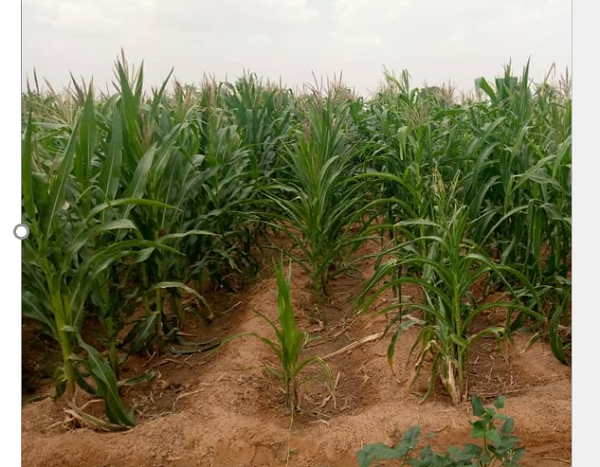
Agriculture has always been the backbone of Nigeria’s economy, contributing 22.35 per cent to the country’s GDP and providing livelihoods for about 70 per cent of the population. Yet, despite its importance, the sector faces significant challenges in meeting local food demands and export needs. Only 34 million hectares of Nigeria’s arable land is currently being utilised, leaving vast potential for growth and development untapped.
To unlock this potential, the Nigerian government must prioritise agriculture, which has the power to increase national production value and position the country as a net exporter of crops like maize. Maize, the third most widely consumed cereal crop globally after wheat and rice, is a staple food for over 300 million people in Sub-Saharan Africa. In Nigeria alone, two-thirds of the population depend on maize for sustenance. Nigeria currently produces 12.2 million tonnes of maize annually, but this is still insufficient due to challenges such as stem borers, fall armyworms, and drought, which contribute to significant yield losses.
This is where the TELA Maize initiative comes into play. The initiative offers genetically engineered maize varieties that are both insect-resistant and drought-tolerant, making them a critical solution to Nigeria’s agricultural challenges. With Nigeria’s population projected to reach 263 million by 2030 and 401 million by 2050, adopting advanced agricultural technologies like TELA Maize is crucial for meeting food demands, driving economic growth, and ensuring long-term food security.
The introduction of TELA Maize is aimed not only at improving yields to combat hunger but also at providing raw materials for industries, generating employment, growing the economy, and contributing to Nigeria’s GDP. Researchers at the Institute for Agricultural Research (IAR) in Samaru, Zaria, who developed TELA Maize, have provided scientific evidence showing that hybrid varieties of this maize, launched in June, would reduce Nigeria’s reliance on pesticides to combat stem borers and fall armyworms. This could potentially save the country at least USD 256 million annually, which is equivalent to NGN 394 trillion, given that it costs USD 50 (NGN 77,000) to protect one hectare of conventional maize hybrids against these pests.
The four TELA hybrid varieties—SAMMAZ 72T, SAMMAZ 73T, SAMMAZ 74T, and SAMMAZ 75T—have shown outstanding characteristics. With proper agronomic practices, these hybrids have the potential to be game-changers in Nigeria’s quest for food security.
Unfortunately, misinformation about TELA Maize is spreading, particularly on social media, fueled by a misguided opposition to genetically modified (GM) technology in Nigeria. These unfounded claims, which often raise false health concerns, undermine the achievements of Nigerian scientists at the IAR and their partners. Rather than celebrating this scientific breakthrough, some individuals are spreading misinformation, possibly influenced by foreign agents with hidden agendas. It is crucial to understand that regulatory bodies like the National Biosafety Management Agency (NBMA), the competent authority on GM technology in Nigeria, have thoroughly evaluated and approved the development and release of TELA Maize, ensuring its safety.
One of the common misconceptions is that TELA Maize employs terminator technology, which it does not. Instead, it uses genetic modification to introduce beneficial traits like drought tolerance and insect resistance. TELA Maize does not incorporate Genetic Use Restriction Technology (GURT), also known as “terminator technology.” The reduced vigour observed in subsequent generations of hybrids is a natural outcome of genetic segregation, not engineered sterility.
Additionally, the transgenic traits in TELA Maize—drought tolerance and insect resistance—are unrelated to seed viability. These traits are designed to enhance crop performance rather than control reproduction. Therefore, TELA Maize seeds remain viable and can be replanted, although replanting may result in reduced performance due to the nature of hybrid genetics. However, the seeds themselves are not sterile.
It is important to note that TELA Maize is neither the first nor the only hybrid crop available in Nigeria. Many conventional seeds possess hybrid traits that farmers have been purchasing and cultivating for years. Examples include the popular Oba Super 1 and Oba Super 2 maize hybrids developed by the IAR at the Ahmadu Bello University, as well as the SAMMAZ series developed by the International Institute of Tropical Agriculture (IITA). These examples show that hybrid seeds have long been a part of Nigerian agriculture, helping to boost productivity and sustainability.
The TELA Maize Project was initiated as a public-private partnership to ensure that Africa grows and adopts drought- and insect-protected maize varieties. TELA Maize uses modern biotechnology to breed transgenic varieties that are resistant to major pests like stem borers and fall armyworms and offer moderate drought tolerance.
TELA Maize is poised to be the future of Nigeria’s agriculture, particularly for small- and medium-scale farmers looking to improve their socio-economic status by moving from subsistence farming to higher-income generation. This maize variety will boost productivity, reduce maize importation, conserve foreign exchange, and enhance the country’s food security profile. Furthermore, widespread cultivation of TELA Maize will create more agri-preneurs and open up additional business opportunities within Nigeria’s agricultural seed industry, as well as in grain exports.
In addition to these economic benefits, the large-scale cultivation of TELA Maize will also have public health advantages. For instance, reduced grain damage from pests like fall armyworms will minimise the risk of mycotoxin contamination, which is a significant health concern. TELA Maize cultivation will also reduce the need for pesticide use, decreasing farmers’ exposure to harmful chemicals and preserving beneficial insect populations, soil health, and the overall ecosystem.
The TELA Maize initiative represents a forward-thinking solution to the challenges facing Nigeria’s agricultural sector. It holds immense potential to revolutionise maize farming, improve food security and foster economic growth. It is crucial that we focus on facts and science, rather than succumbing to misinformation and fear-mongering. TELA Maize is a scientific innovation that Nigeria needs to adopt, support and celebrate for a more secure agricultural future.
Gidado is the director, the agricultural biotechnology department, National Biotechnology Research and Development Agency (NBRDA).

